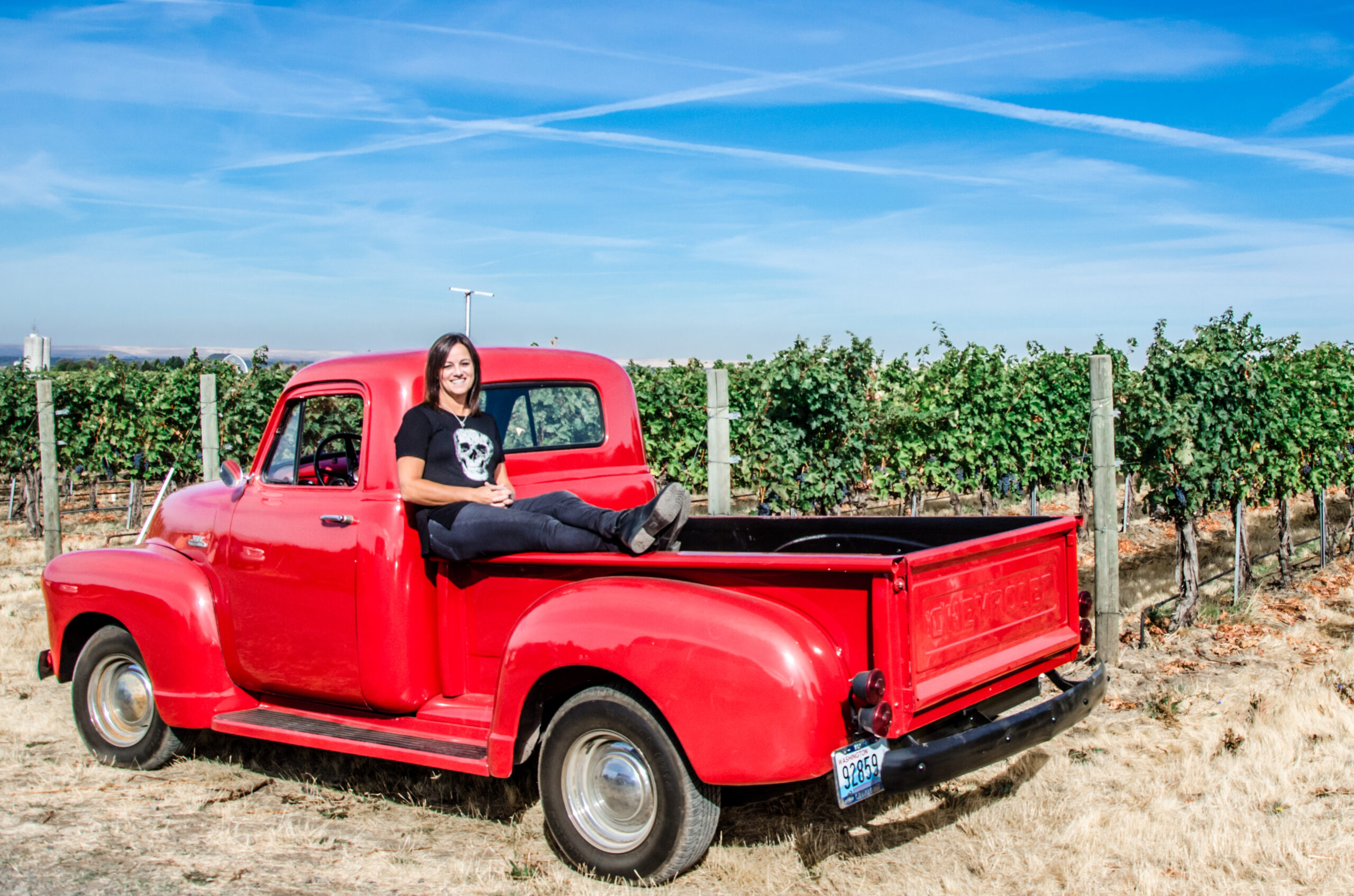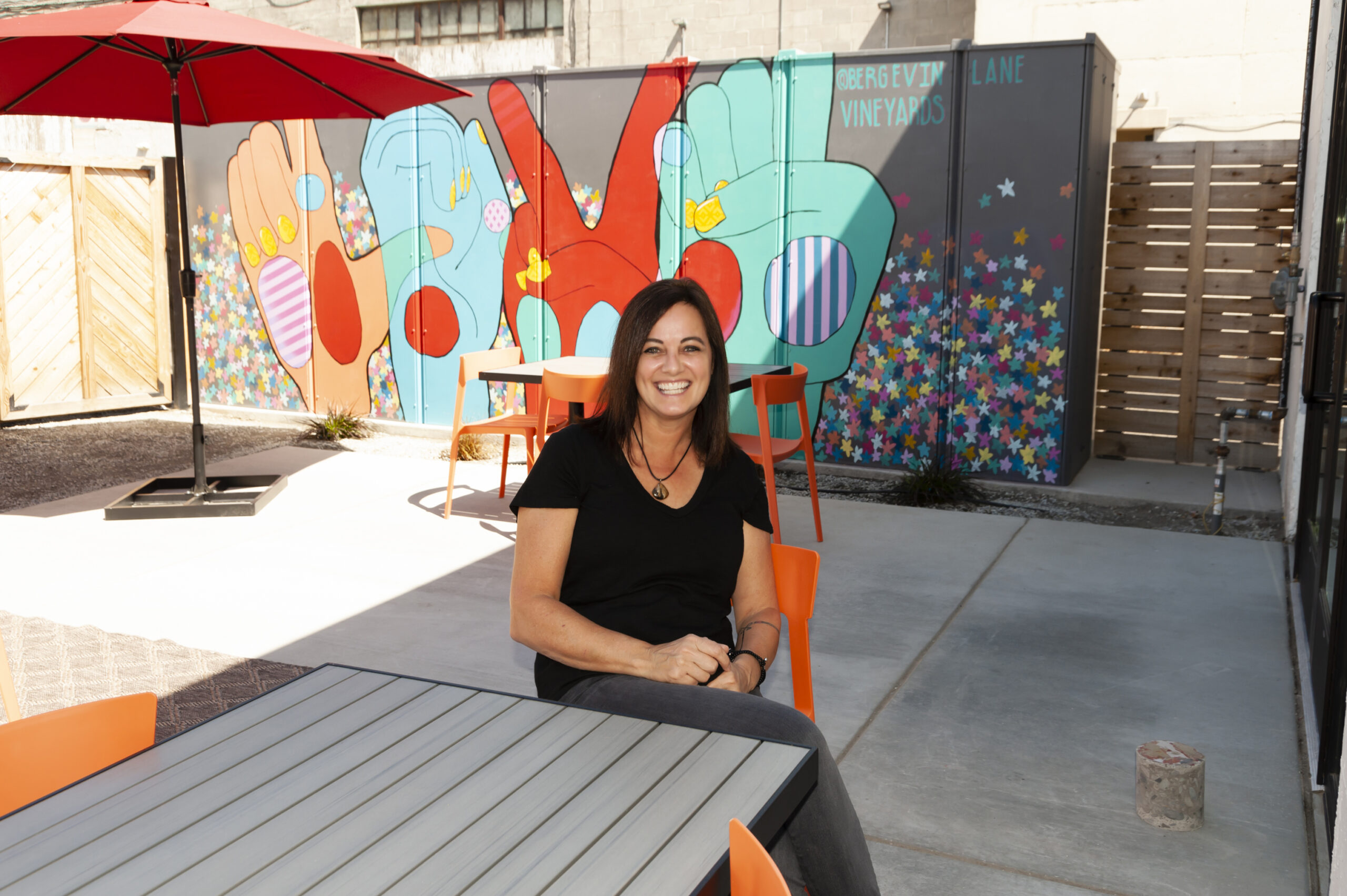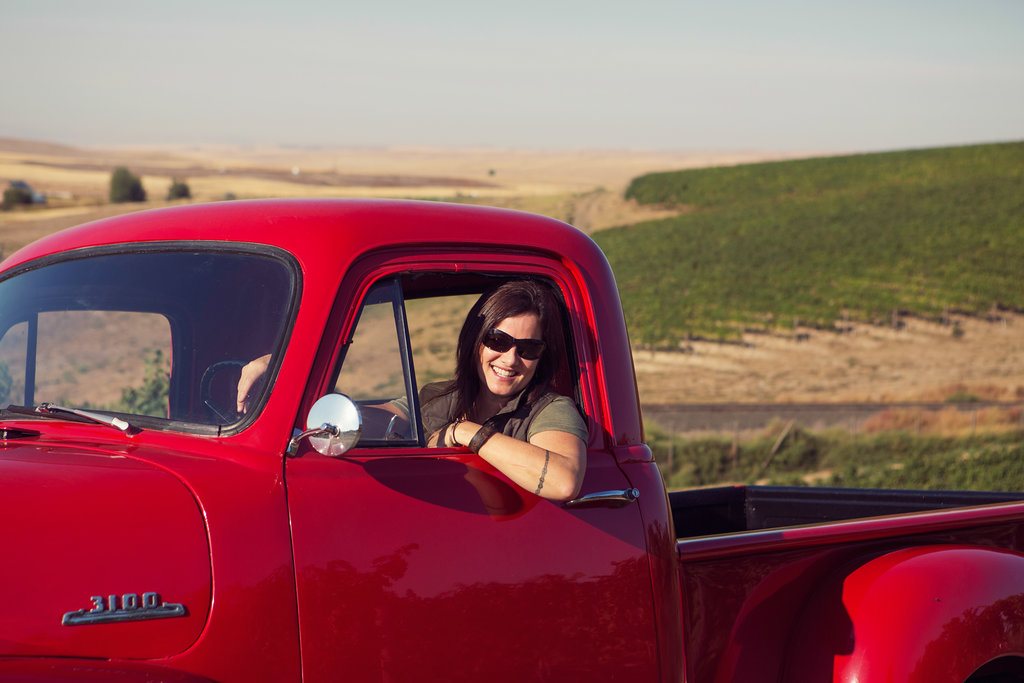We might be a bit biased, but our winemakers and grape growers are everyday legends. They have a deep love for what they do, and what their wine can do: bring people together. From biostatisticians to scientists, professional snowboarders to quarterbacks, cattle ranch hands to geologists, bartenders to English teachers, masters of wine to aeronautical engineers, oceanographers to actors, and so many more. There is no shortage of personalities in Washington State, which means there is no shortage of stories. We’re so excited to (re-)introduce you to the character, and characters of Washington State. Below, get to know Annette Bergevin, owner and winemaker of Bergevin Lane Vineyards.
Washington Wine: What was it like growing up on a vineyard?
Annette Bergevin: Watching the Walla Walla wine industry evolve has been pretty cool. I got to see it from the ground floor. I’m fifth generation, and my family started out dry land farming: wheat fields rolling forever. Our Estate Vineyard is planted on the land that I grew up on.
My father’s a third-generation farmer and saw our land as a perfect place to grow grapes. We did a lot of analysis before saying, “Oh, let’s just do this.” There was some serious thought put into it. Specialists came in and tested the soils. When we planted our vines, we decided to change the direction of each block and we lost a couple of plantable acres. We did this to ensure the direction of each block was based on the best ripening potential.
WW: What kind of other crops did you grow before grapes?
AB: Prior to growing grapes on the land, where our Estate Vineyard is just North of Walla Walla, we grew wheat, a little barley, and peas. It was wonderful because every spring you would find my brother, sister and me hunkered down in the pea patch, picking peas, bringing them home, my dad saying, “Don’t eat them all. That’s our crop.” Now we say this to our kids with the grapes!

WW: What surprises people when they come here for the first time?
AB: When people come to Walla Walla for the first time, they are amazed by the friendliness of the people. I always see this as a reoccurring theme. Friends from other states will act surprised and say, “Somebody smiled at me.” When you go to the grocery store, you actually have to plan extra time to visit with folks, because that’s what they do. They bump into you at the grocery store and they’re hanging out. They love to know how you’re doing. It’s a very social little community and I think everybody really wants to work together. We’re too small to alienate folks. When we were first getting started, we had folks who helped us out that didn’t have to, and it was an amazing feeling. Even this harvest, we came across something that was new to us and we were able to reach out to our friends in the valley and in the middle of harvest, they were able to stop what they were doing and give us an answer or send a picture or help us out with the problem.
WW: Is the collaborative element unique to this area?
AB: From the beginning, there were a lot of us who said we were not competing against each other. We all want a piece of the pie, but we’re competing against other regions, countries, and all of us have the end goal to put Washington State on the map.
WW: What separates Washington State wine from other places?
AB: One of the things that we see when we’re out on the market showing our wines is that the quality is amazing and there is a lot of great quality coming out of the state and various regions. But I think our price point, when you put that alongside our exceptional quality that’s inside the bottle, I think people are amazed. They’re surprised at what’s happening in our state. A lot of our wines show a sense of place, which I love. Especially with our Syrahs. You can almost smell that vineyard, that dirt. You can feel it. You can smell the vines when you take a drink.
WW: What would be one word you would use to describe the Walla Walla Valley or wines that come out of this region?
AB: Passion.
WW: What’s a personality trait you go for in the wines you create?
AB: Approachable.
WW: When you’re thinking about the experience in the winery and tasting room, how do you create this environment?
AB: I want people to leave with a smile on their face, and happiness in their soul. I want them to come in and have a good time, enjoy the wine experience, and not be intimidated.
WW: How do you make wine less intimidating, or more accessible, to consumers who don’t know much about wine?
AB: When I worked in the Bay Area years ago (when dinosaurs were on the Earth), I worked in customer service. We were taught that 100 people are going to come up to you and ask you where the bathroom is, and every one of them doesn’t know where the bathroom is, so you have to treat them the same as the first person that day. For people who are just starting to learn about wine, they’re so self-conscious, but we all started some place. Helping instill that passion for someone, so that they get to experience what they’re sipping, and letting their pallet be the boss is always the goal. It doesn’t matter what anybody else says. If they like it, that’s perfect. The goal is always to put a quality wine in somebody’s glass. From there, it’s all theirs. They get to try it, they get to taste it, and they get to decide if they love it or love something else. It’s all about their palette.
We love to do blind tastings. People will walk in and specifically say, “I don’t like Merlot,” but we love our Merlot, so we’ll walk around the corner and pour a sip of our Merlot, and they’ll try it and go, “This is amazing. What is this?” And our favorite response is, “This is Merlot.” It’s fun. People laugh, and they go, “Ok I get it.” It’s getting rid of people’s pre-conceived notions. It’s all about trusting your palette. It takes everything you know, subjectively, off the table. And this comes up to what you’ve experienced with different wines, different regions and different vineyards. That’s the fun part.
WW: What has been an exciting change for this area for wine?
AB: As the wine world evolves, we’re seeing people across the country and from other regions looking at Washington State as a great place to produce wine and grow grapes. I think people are realizing what an opportunity we have here. And we’re still such a young region in the grand scheme of things. The only factor that keeps us different than a Napa is we’re not close to a major metropolitan area. You really have to make a plan to come to Walla Walla.
Our town has done a great job of holding onto its charm. Our universities and colleges bring people in. We have a lot to do outside of just wine tasting. We have amazing golf courses here; there’s road biking; a fantastic food scene, a new pool downtown and many other activities on the horizon. And to cap that off, if you talk about food and wine, for a small community, we have some of the most fabulous restaurants. And all ranges, from amazing taco trucks to super high-end single bite, rock-your-world restaurants.
I am continually amazed by the number of people Walla Walla attracts and how many people want to move here. When we would go out to dinner we used to know just about everybody in the restaurant. Now, we go into a restaurant and might not know anybody. We almost feel like tourists in our own town. It’s certainly changed a lot.
WW: What is something that’s exciting for you looking into the mist of the future?
AB: As our vines get older, the wines progressively get better with age. So we love watching our vines mature and we hope down the road to possibly build our winery on that land where I grew up. But that’s down the road. We have to sell just a couple more bottles of wine.
People always tell me it’s their dream to also own a winery. And it is that: you live a life you wouldn’t get to otherwise. With our size winery, contrary to popular belief, I don’t think we’ll ever be uber rich however at the end of the day we get to enjoy a beautiful glass of wine that says, “This is what we made!” We also get to meet so many fabulous people along the way. We walk through our vineyards throughout the growing season and we take such pleasure in our sense of place. We’re firmly planted here. Deeply rooted, so to speak, in the Walla Walla Valley.
WW: What previous lives have you had in terms of jobs or traditions?
AB: When I graduated from college, I moved down to the Bay Area. And I worked for the airlines for a bit and then went into telecommunications. During that whole time I would go wine tasting in Napa Valley and around that area. My dad had me bring home his wine clubs from that area—and back in the day, those were wines I could not afford—so when I got home, he’d usually share a bottle with me, and I think through his passion for it, I also became sucked in. It was amazing. I fell in love with it. What I really, really enjoy is how wine brings people together. That one glass makes a conversation so much more fun, whether it’s a good day or bad. I love how wine brings people together.

Are you a winemaker or have your hands in making Washington Wine? We’d love to hear from you! Get in touch with Heather Bradshaw at hbradshaw@washingtonwine.org. We’ll set up a time to chat so we can share your story with the world.

